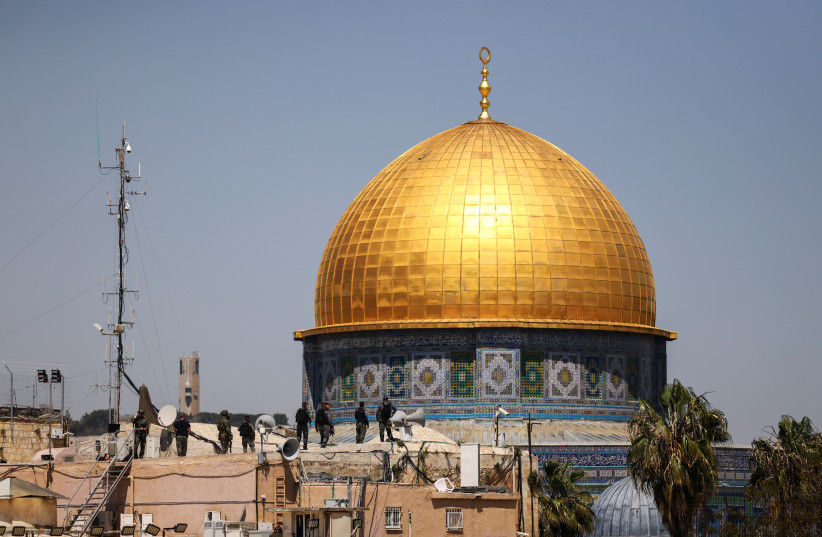We are probably not going to be entertained in the coming fifth season of our long-playing live folk opera, the one based on the struggle for religious freedom in a Jewish theocracy masquerading as the only democracy in the Middle East.
No, this is not another Kotel story, but it is integrally related. For the struggle for religious pluralism is the same struggle as the one for civil equality of rights, such as those so proudly proclaimed in our Declaration of Independence.
Alas, the struggle for religious pluralism in general in Israel is not a hot item politically – only when a certain powerful minority can wag the dogs of the party in power.
Nothing is going to change at the Kotel until the haredim in power are ousted and replaced by a democratically elected Western Wall Administration, a civil service position in a government interested in actually making an historic change. This will take a while, but before you know it, a grassroots movement might gain followers and acquire sufficient political weight to effect change. It might even take on the momentum of a religious revival, seizing the opportunity for social redemption by proclaiming justice throughout the land. Or not.
Two bad decisions
It is incumbent that we Israelis, who have made history in so many areas unimagined at the time of our struggle for independence, apply the same problem-solving, Start-up Nation spirit that drove our founders in rectifying some of their basic errors of judgment or lack of foresight. Among the bad mistakes of Israel’s early leaders, two stand out: Ben-Gurion’s lack of foresight in caving in to the demands of the haredim for an initial conscription exemption of only a few hundred yeshiva students; and Dayan’s lack of foresight in relinquishing control of the Temple Mount to the Wakf.

Historically, both decisions have led to disastrous, perhaps unforeseeable results: the initial cohort of an exempted few hundred has been fruitful and multiplied into millions, led by fundamentalist religious politicians as power-hungry as secular ones. They have retained considerable political power, undeterred by the previous convictions and plea bargains of the leaders of the two so-called religious parties, Shas and Agudat Yisrael. They are out of sight, but never out of mind politically.
Politicization of religion
Which brings us back to the main issue: the politicization of religion by the very parties that claim to be religious. The very term is an oxymoron: how do politics and religion go together? In a true democracy, they cannot. For a true democracy recognizes the difference between having the freedom of religion, and having the freedom of the state religion.
The US is still the bastion of democracy I left in 1972, when I made aliyah to an Israel that had not yet come to terms with Ben-Gurion’s mistake. Not much has happened in the interval of a movement trying to correct his fundamental blunder: not remaining steadfast to the spirit of Zionism and instead demanding the haredim join the Jewish people in its great endeavor to establish a Jewish state, in accordance with the provisions of the Declaration of Independence.
Think of how different life would be if the first Basic Law were the principle of the separation of religion and state. Hard to imagine here, right? But approximately the other half of the Jewish people lives full Jewish lives in a country founded upon just that democratic principle of equality.
Think of a renewed Israel, where life is governed in accordance with the values of the Declaration of Independence. Anyone can marry or divorce anyone. The wedding ceremony is the business only of the bride, groom, and caterer. Government funding for all religious institutions would be equally disbursed. The fallen Kotel boulder would be removed, and the pluralistic prayer section restored to peaceful use, with any violators of a religious service promptly detained.
Yes! Such change is possible, but only if enough Israelis feel the need for it. We could express that need at the ballot box in November by electing a government that is truly committed to fulfilling the promise of religious freedom in the Declaration of Independence.
The movement for religious freedom should probably start small. How about with that one relatively small boulder? It might take a petition to the High Court against the Jerusalem Municipality, demanding it repair the prayer platform. Another petition could focus on expanding the recent ruling allowing Internet weddings. If we will it, someday the abolition of the Chief Rabbinate’s anti-democratic control of over Israeli society by what used to be called haflaya datit, or religious coercion, might not be a dream. Israelis know that change is possible. Let freedom ring! ■
The writer is a former chief copy editor and editorial writer of The Jerusalem Post. His novel, The Flying Blue Meanies, is available on Amazon.
